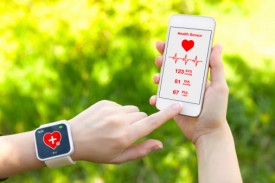Could Mobile Health Applications Prevent Heart Attacks?

- As the mobile health industry continues to invest in new devices and apps to improve consumer health across the medical care spectrum, stakeholders and analysts look further to understand whether mobile health applications can actually reduce key risks of disease and medical conditions. For example, could mobile health applications actually decrease one’s risk of a heart attack?

According to some findings via the Hello Heart App, it is possible for mobile health applications to help lower the blood pressure among users. Out of a sampling of 2000 random consumers who downloaded this particular app, one out of four reduced their blood pressure by 22 points and therefore cut their risk of heart attacks by 50 percent.
Through the use of behavioral approaches and clinical research, mobile health applications could revolutionize healthcare and strengthen consumers’ health and wellness. Whether it’s through smartphones or wearable devices like the smartwatch or smart glasses, mHealth possibilities allow users to track their vitals and better understand their heart health.
Some issues like hypertension or high blood pressure has been shown to lower merely with greater patient engagement and knowledge of the cardiovascular system. Both greater patient engagement and intrinsic motivators are necessary stimulants that help consumers effectively change unhealthy behaviors.
As time goes on, mobile health applications tend to help consumers develop greater self-care strategies including medication adherence, stress management, diet, and fitness. Those who are more engaged with mobile health applications tend to see faster and better results than individuals unable to keep up with tracking their heart health.
It is also important to remember that mobile health applications could play a significant role in boosting users’ exercise levels. Stimulating more physical activity is key toward reducing risks associated with heart failure.
According to a press release from the American Heart Association, those who have doubled or even quadrupled the amount of exercise recommended by federal guidelines were able to reduce their risk of heart failure by 20 and 35 percent. A key study illustrating these results was published in the American Heart Association’s journal Circulation.
“Walking 30 minutes a day as recommended in the U.S. physical activity guidelines, may not be good enough – significantly more physical activity may be necessary to reduce the risk of heart failure,” Jarett D. Berry, M.D., senior author of the study and an associate professor of internal medicine and clinical sciences at the University of Texas Southwestern Medical School, stated in the press release.
“If you look at the general population,” Berry continued, “we’ve had tremendous success in reducing coronary heart disease over the last 30 years. But heart failure rates have not declined enough. The findings from the present study suggest that higher levels of physical activity may help combat this growing burden of heart failure.”
Essentially, the researchers discovered that the federal guidelines recommending 150 minutes of moderate exercise per week led to only a small reduction in heart failure risk. The new study shows that doubling this amount of exercise is actually necessary to substantially cut the amount of heart disease throughout the country.
Essentially, there is an inverse relationship between heart failure and physical activity levels. The more one exercises, the lower their risk of cardiovascular disease. Mobile health applications could be used to further stimulate exercise among users.
“Future physical activity guidelines should take these findings into consideration, and potentially provide stronger recommendations regarding the value of higher amounts of physical activity for the prevention of heart failure,” Ambarish Pandey, M.D., lead author of the study and a cardiology fellow at University of Texas Southwestern Medical School, said in a public statement.
